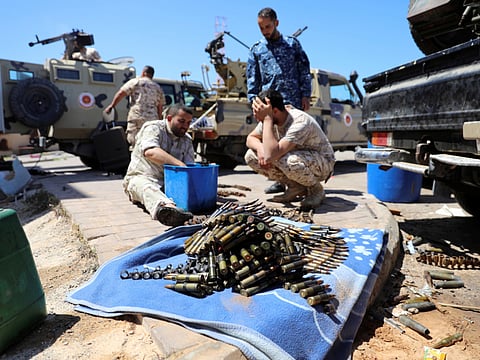Libya crisis: UN to scrap peace meeting
We cannot ask Libyans to attend conference to the backdrop of shelling, says UN envoy

Tripoli: Fighting on the outskirts of the Libyan capital, Tripoli, forced the postponement of an international peace conference to reconcile feuding factions, in a major blow to UN efforts to heal rifts that are threatening to plunge the OPEC member back into civil war.
Ghassan Salame, the United Nations envoy who just weeks earlier had triumphantly announced that the meeting would be held on April 14, said it would now be delayed.
We “cannot ask Libyans to attend a conference to the backdrop of artillery shelling and air raids,” he said in a statement.
“I will work, to the fullest possible extent, to enable the Libyan National Conference to take place as soon as possible, once the conditions to enable it to be held are re-established.”
The Libyan National Army under eastern military commander Khalifa Haftar have pushed their offensive on Libya’s critical northwestern region in recent days, where they have run into opposition from militias allied with the internationally recognised government of Prime Minister Fayez Al Al Sarraj.
World powers have called on Haftar to back down or risk tipping the country deep into armed conflict.
Libya slipped into chaos after the NATO-assisted removal of Muammar Qaddafi and has been ruled by the two feuding administrations and dozens of regional militias since 2014.
Also Read: Libyans fear showdown as Haftar eyes Tripoli
Also Read: Let Libyans solve their own problems
The ensuing chaos provided fertile ground for the rise of militants, including those linked to Daesh.
Haftar has already secured much of the country and its oil fields and facilities, after trekking from his eastern stronghold to the south.
Tripoli, however, is viewed as the key prize, as it’s home to the state-run National Oil Corp.’s headquarters, as well as the central bank.
Analysts have said Haftar could be looking to either strengthen his position at the bargaining table or to secure the funds he need for his forces—the country’s best organised.
Attempting to take Tripoli involves huge risks.
The Al Sarraj government, while not commanding major forces, has the backing of strong and battle-tested militias that have vowed to stand firm against Haftar.
“Haftar is now risking the loss of the position of strength he acquired by taking control of the southern Fezzan region in February should his advance on Tripoli fail,” IHS Markit Middle East analyst Ludovico Carlino said in a note.
“Fighting is likely to persist and intensify over the coming weeks, unless Haftar announces an end to LNA military operations.”
There are no signs at the moment of an end to hostilities.
He has ignored the sweeping international condemnation, while Al Sarraj has ordered the launch of his own offensive, dubbed “Volcano of Anger,” to reclaim territory the Libyan National Army controlL





